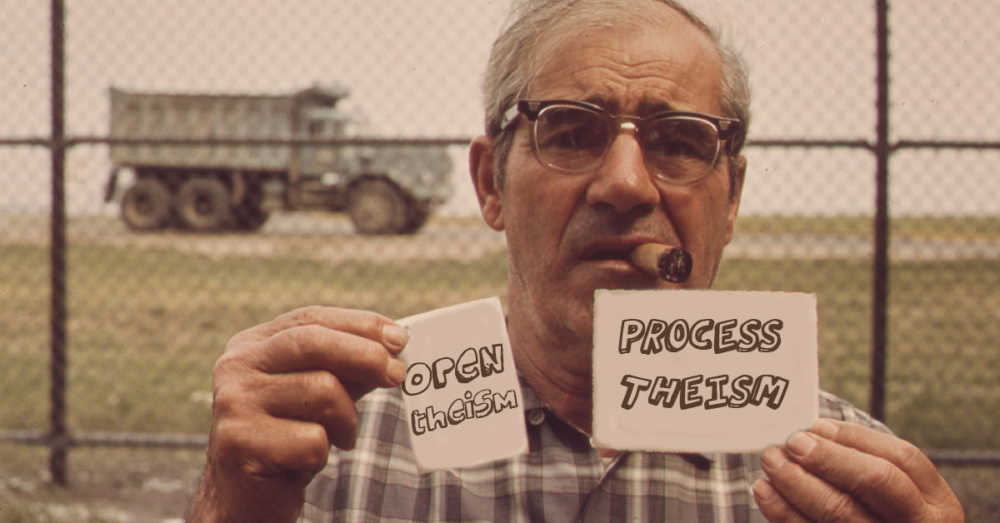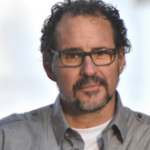We run our website the way we wished the whole internet worked: we provide high quality original content with no ads. We are funded solely by your direct support. Please consider supporting this project.

Process Theology & Open Theism: What’s the Difference?
Question: When ReKnew talks about Open Theism is it a mistake for people to equate it with Process theology, and if so what are the defining differences?
I guess I am starting to lean toward Dr. Boyd’s thoughts for all things theologically egg-heady, so I thought I would ask the question. Your ministry has been freeing for me, and has helped to save my faith after my son had cancer. I only joke because I feel very close to you guys even though we have only met in passing in a very crowded coffee shop and after a couple of sermons that hit me so hard I was at a loss for words.
Answer: Thanks for the kind words of affirmation. I wrote my doctoral dissertation on Process thought (Trinity and Process) where I critiqued the metaphysics of Charles Hartshorne and tried to demonstrate that one can adopt a system that has all the explanatory power of Process Thought (PT) without its unorthodox implications. The unorthodox implications are these.
- In PT, God exists eternally in relation to a non-divine world. So PT denies “creation ex nihilo”
- In PT, God is bound to metaphysical principles that govern both God and the world. So God isn’t able to really interact with the world as a personal being. God must always, of necessity, respond in ways that the metaphysics of the system stipulate. This means…
- In PT God can’t intervene in unique ways, like personally answering prayer
- In PT God can’t intervene and perform miracles
- In PT God can’t become uniquely embodied, as he is in Christ.
These are pretty serious shortcomings. I hope it’s clear that PT has got little in common with Open Theism other than that we both believe the future is partly comprised of possibilities. But even here there is a major difference. In Open Theism, God chooses to create a world with an open future, while in PT God has created of necessity.
I am very concerned that so many progressive thinking evangelicals are flirting with Process Thought. It’s really not a friendly home for anything like orthodox Christianity. While many find the dynamic and relational ontology of process thought, compelling—I can see how this is attractive— the intrinsic nature of the system is hostile to the Christian faith.
If you want to go deeper on this topic, my book Trinity and Process seeks to clarify all that’s positive with PT while avoiding all that’s negative. For a succinct summary of some of the shortcomings of PT, see chapter 9 in my book Satan and the Problem of Evil.
Category: Q&A
Tags: Open Theism, Process Theology, Q&A
Topics: Open Theism What it is and is not
Related Reading

How can prayer change God’s mind?
You’ve argued that since God is all-good, he’s always doing the most he can do in every situation to bring about good. But you have also argued that prayer can change God’s mind. How are these two beliefs compatible?

How do you respond to Malachi 3:6?
“For I the Lord do not change; therefore you, O children of Jacob, have not perished.” Some cite this verse as evidence that God need never be flexible in his plans and change his mind. But this claim contradicts all the explicit declarations in Scripture which state that God does frequently modify his plans and…

Reflecting on Open2013
T. C. Moore has posted some of his reflections from the Open Theism conference. T. C. was one of several people who pulled this conference together and he did a great job. He’s also incredibly smart and very active in the open view community. Also, he’s a young church planter in Boston and I’m sure he’s…

Shouldn’t preachers rally Christians to fight political injustice?
Question: My pastor has publicly supported your book The Myth of a Christian Nation. But he’s recently called on the church to take a stand against the injustice of our local government cutting funding for inner city recreational facilities. This seems right to me, since we’re suppose to defend the cause of the poor and…

What is the significance of Matthew 25:41?
The Lord teaches that on the judgment day he will say to the wicked, “Depart from me into the eternal fire prepared for the devil and his angels…” Hell was expressly prepared for “the devil and his angels”; humans were never meant to go there. But if God eternally knew that certain persons would end…

Ask Greg Anything on Reddit!
Greg is going to be featured on Reddit! Yes that’s right. You can ask Greg anything. Your questions might be serious like: Why is there so much evil in the world? Why can we trust the Bible? What caused you to be a pacifist? Or they might be less so: Why do you preach without…
